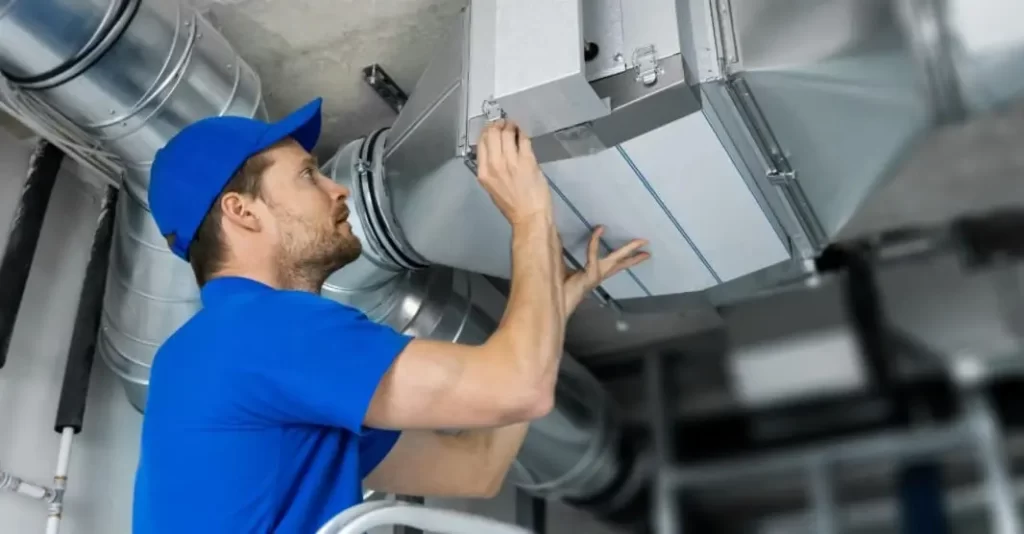I’ve had the opportunity to work in the HVAC field, and I’d like to share some insights that can help you understand the complexities and rewards of learning HVAC.
is HVAC Hard to Learn?
HVAC training is generally not considered difficult, While it involves technical aspects, hands-on experience, and some misconceptions, with proper training and dedication, anyone can learn HVAC.
What is HVAC?
HVAC stands for Heating, Ventilation, and Air Conditioning. It’s all about keeping indoor environments comfortable and safe. Heating warms spaces during cold weather, ventilation ensures fresh air circulation and air conditioning cools spaces in hot weather. HVAC systems are essential for homes, businesses, and industries.
Why do people consider learning HVAC?
Learning HVAC is attractive for several reasons. It offers a promising career path with job stability and growth opportunities. Additionally, the skills acquired can be applied to both professional and personal settings. Many also find it fulfilling to work in a field that directly impacts people’s comfort and well-being.
The Complexity of HVAC Learning: How Challenging Is It?
Table of Contents
ToggleTechnical Complexity

Explanation of technical aspects
Learning HVAC involves delving into technical aspects, such as understanding how heating, ventilation, and air conditioning systems function. It includes comprehending the mechanics of heating elements, air circulation, and cooling processes. This can seem intricate at first, but it’s essential for effective HVAC operation.
How electricity, air, gas, and heat play a role
Electricity, air, gas, and heat are fundamental elements in HVAC systems. Understanding their roles is key to becoming proficient. Electricity powers various components, air ensures proper ventilation, gas can be used as a heating source, and heat is transferred to control temperature. Grasping how these elements interact is part of the learning process.
Hands-On Work
Importance of practical experience
HVAC learning isn’t just about theory; hands-on experience is invaluable. Working with actual HVAC systems allows learners to apply their knowledge in real-world scenarios. It builds confidence and problem-solving skills. Trainees get to troubleshoot issues, repair equipment, and fine-tune systems, all of which are critical skills in the HVAC field.
How hands-on work contributes to learning
Hands-on work enhances understanding. It’s one thing to study diagrams and theories, but it’s quite another to feel the equipment, hear the sounds, and see how adjustments impact performance. This tactile learning approach helps learners become adept at diagnosing and rectifying HVAC system issues.
Technological Advancements
The impact of technology on HVAC
HVAC technology is continually evolving. Modern systems incorporate advanced features, digital controls, and energy-efficient components. These advancements make HVAC systems more efficient and environmentally friendly. However, staying updated with these technological changes is essential for HVAC professionals.
Tech-savvy in HVAC
Being tech-savvy is increasingly important in the HVAC field. Technological knowledge allows technicians to work with cutting-edge systems, diagnose faults using digital tools, and optimize HVAC performance. Embracing technology ensures HVAC professionals remain competitive and effective in their roles.
What a Day of an HVAC Technician Looks Like
Curious about the daily routine of an HVAC technician? Allow me to share a glimpse into the typical activities of Our HVAC Technicians.
- Morning Start: The day kicks off with a team gathering in the early morning. We discuss our schedule, exchange insights from past jobs, and ensure our service vehicles are prepped and ready to roll.
- Service Calls: One of the fascinating aspects of this job is its diversity. No two days are identical. We’re always on the move, responding to service requests. It might be a malfunctioning furnace in a cozy home or a commercial AC unit acting up. Each call presents a new challenge.
- Troubleshooting: When we arrive at a job site, it’s time to put on our thinking caps. We dive into the HVAC system, trying to identify the issue. Sometimes, it’s as simple as a clogged filter, while other times, it involves intricate problem-solving. But that ‘aha’ moment when we pinpoint the problem? That’s pretty rewarding.
- Repairs and Maintenance: Much of our day is spent on hands-on work. We clean filters, swap out worn parts, and ensure everything operates smoothly. It’s practical work that keeps us engaged, and I’ve learned a lot from it.
- Customer Interaction: One of the highlights of the job is interacting with customers. We’re not just fixing machines; we’re enhancing people’s comfort. We explain our actions in straightforward terms, provide maintenance tips, and engage in meaningful conversations.
- Lunch Break: Of course, we take a midday break to recharge and share stories with colleagues. Sometimes, we swap tales of unusual challenges we’ve encountered on the job.
- Wrapping Up: As the day nears its end, we conclude service calls. We meticulously review our work to ensure everything functions as intended. For new installations, we subject them to thorough testing to guarantee their reliability.
- Paperwork: Like any profession, there’s a paperwork aspect to tackle. We document our actions, list the parts we’ve used, and offer suggestions for future maintenance. It’s about maintaining order and keeping customers informed.
- Heading Home: Finally, we head back to the office or our homes, depending on our starting point. It’s satisfying to know we’ve made a positive impact, whether it’s restoring comfort on a scorching summer day or ensuring warmth during a cold spell.
is HVAC Hard to Learn? : Career Considerations

For Aspiring HVAC Technicians
The journey to becoming an HVAC technician
Aspiring HVAC technicians embark on a rewarding journey of learning and skill development. They typically start by obtaining a high school diploma or GED. A solid educational foundation in math, physics, and chemistry is valuable for understanding HVAC principles. Following this, individuals often enroll in HVAC training programs to gain specialized knowledge.
Prospects and challenges
The path to becoming an HVAC technician comes with promising prospects. The HVAC industry offers job stability and opportunities for growth. However, it’s not without its challenges. Technicians may encounter physically demanding tasks, complex problem-solving, and the need to adapt to evolving technology. Certification exams can be rigorous, but achieving certification is a significant milestone that enhances one’s career prospects.
DIY Enthusiasts and Homeowners
Can homeowners handle basic HVAC tasks?
Homeowners and DIY enthusiasts often wonder if they can tackle basic HVAC tasks themselves. The answer depends on the complexity of the task. Some simple maintenance tasks, like cleaning filters or adjusting thermostats, can be managed by homeowners. However, when it comes to more intricate repairs or installations, it’s advisable to seek professional assistance. Attempting complex HVAC work without proper knowledge can lead to costly mistakes.
When to hire a professional?
Homeowners should consider professional help when faced with issues like malfunctioning heating or cooling systems, refrigerant leaks, or electrical problems. Hiring a professional ensures the safety of the HVAC system and prevents further damage. It also guarantees that the system operates efficiently, saving on energy costs in the long run.
What are the Most Important Skills of HVAC?
- HVAC technicians should have strong problem-solving skills, as they troubleshoot and fix complex systems.
- Attention to detail is crucial to ensure precise work and system efficiency.
- Good communication skills are vital for working with customers and team members.
- Physical fitness helps technicians handle the demands of the job.
Is HVAC Work Stressful?
HVAC work can be challenging but not necessarily stressful. It depends on factors like workload and time management. Technicians often find it rewarding to solve problems and help people.
How Hard is HVAC Math?
HVAC math involves basic calculations like measuring airflow and determining system capacity. While some math is involved, it’s not overly difficult. Training programs provide the necessary math skills.
What Qualifications Do I Need to Be an HVAC Technician?
- A high school diploma or GED is the minimum requirement.
- Completing an HVAC training program is valuable.
- Some states may require licensing, which usually involves passing an exam.
- A willingness to learn and hands-on experience are also essential.
How to Become an HVAC Tech?
- Start with a high school diploma or GED.
- Explore HVAC training programs, which can be completed in as little as 10 months.
- Gain hands-on experience and knowledge.
- Consider pursuing certification for career advancement.


